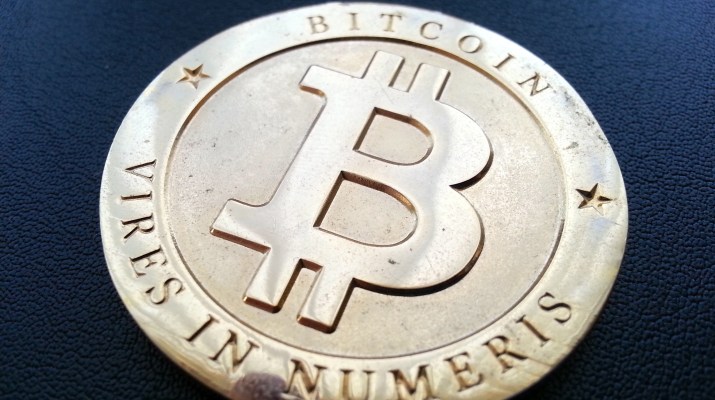Over the past couple of months, there have been a few Bitcoin app rejections by Apple that have made some waves. First, the venture-backed startup Coinbase had its app removed entirely from the App Store. Today, a blog post from peer-to-peer messaging and payments app Gliph highlights its own rejection and the subsequent removal of its ability to transact in Bitcoin.
Gliph’s Rob Banagale talks about a few aspects of the rejection, including the technical details of how Gliph handles Bitcoin, Apple’s motivations for rejecting the app and the possibility that it could change its mind.
The rejection, Banagale notes, was based largely off of section 22.1 of Apple’s App Store review guidelines. The rule states that “apps must comply with all legal requirements in any location where they are made available to users. It is the developer’s obligation to understand and conform to all local laws.”
Bitcoin is not illegal, but it is also not legally recognized by governments as a currency. This gray area is what is leading Apple to reject Bitcoin-transaction apps.
We reached out to Banagale to talk about the way that Gliph functions, and how it differs from apps like Coinbase. He notes that the app works with wallets like those from Coinbase and BIPS, but doesn’t function as a wallet itself. Instead, it passes along requests for wallet addresses (just strings of numbers) to the wallets themselves, and back to the recipient. The setup also means that Gliph does not deal with exchanges.
“We didn’t want to specify which wallet you had to use,” Banagale says. “By doing it that way we aren’t really manipulating Bitcoin directly.”
This method means that Gliph isn’t actually processing Bitcoin transactions, just facilitating them. It’s a distinction that may either be lost on Apple, or that isn’t evident enough to differentiate Gliph from other Bitcoin wallet apps.
Banagale notes that Apple itself may be planning on entering the payments game outside of its own stores, and that this may have influenced their decision to reject Bitcoin apps. But that’s probably pretty unlikely. It is clear, though, that Apple isn’t acting as any real advocate of Bitcoin at this point, something that Banagale says it’s in a good position to do.
In the end, the answer is likely fairly simple. From our understanding, Apple rejected both Coinbase and Gliph based on rule 22.1 specifically. Yes, the interpretation of the rule is fairly narrow, as Bitcoin has not been declared legal or illegal in most of the areas that the apps have been available. But this is not a matter of speculation about whether Bitcoin will become legal, it’s a simple matter of whether or not it is currently legal. Since there is no clear-cut government acknowledgement of Bitcoin’s legality, Apple is simply taking the safest, most protective path by disallowing transaction functionality in App Store apps — for now.
Google has similar rules related to illegal activity on its Google Play store, but has chosen not to enforce them on Bitcoin apps at this point. The stance there appears to be one of lenience or, as Banagale puts it, ‘optimism’ about the future legal status of Bitcoin.
Still, Banagale feels that Apple got this one wrong. He points out that Gliph does not actually handle transactions, but only facilitates the triggering of them via online wallets. Yes, it’s a technicality, but there are plenty of apps that function as a basis of a small technical twist. Literally billions have been spent and earned by companies based on technicalities. So, in the case of Gliph, perhaps the functionality merits another look by Apple, but we wouldn’t hold our breath.
This is a case where the rules that Apple uses to govern its store have to take into account the probable byproducts of litigation or legal ramifications, not just current complaints. And for a company with as big a target painted on it as Apple, caution is likely the better part of valor here.
We’ve heard, but don’t know exactly why, Apple has been issuing stern comments to developers about legal notices in apps. They’ve been instructing app makers to ensure that any links to legal info about using Apple assets or other items with terms and conditions of use attached are visible and links are accessible when appropriate.
It could be that the stance on Bitcoin is tied into that, but Apple has had a fairly standard approach to transaction functionality in the App Store for years when it comes to the crypto currency. The recent rejection of Coinbase and Gliph doesn’t represent an about-face so much as perhaps ‘enhanced awareness and activity’ when it comes to rejecting apps based on rule 22.1.
With the recent loss by Apple in the courts related to the e-book case and the installation of a government-appointed monitor, the company is under more scrutiny than ever. Whether that’s coloring their handling of Bitcoin apps is a matter of conjecture, as we’ve gotten no information that indicates one way or another.
As to how Apple might handle Bitcoin transactions in apps in the future, look to how it handles gambling apps, also covered in the App Store rules. For states or countries that allow gambling — like Nevada or the UK — Apple allows apps to use geo-fencing to restrict activities to those regions. A similar system could be put in place to allow Bitcoin transactions in places where it has been deemed ‘legal’ by a government entity.
Is there a personal vendetta towards Bitcoin because Apple could expand its Apple ID-based payment system? That’s not our understanding. But will its attitude towards Bitcoin be one of caution for the foreseeable future? Yes. And any developers looking to include core transaction elements would do well to note that stance for now.
Disclosure: Author owns a very, very small amount of Bitcoin.
Article updated to clarify the legal status of Bitcoin.
Image credit: Zach Copley
